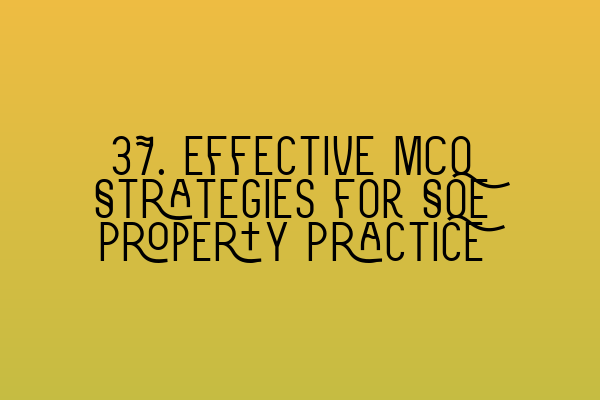37. Effective MCQ Strategies for SQE Property Practice
Preparing for the SQE Property Practice exam requires a comprehensive study plan and effective strategies to tackle multiple-choice questions (MCQs). The MCQ section of the exam is designed to test your understanding of key concepts, application of legal principles, and critical thinking skills. In this blog post, we will discuss 37 effective strategies to help you excel in the SQE Property Practice MCQs.
Before we dive into the strategies, it’s essential to note that practice is key. Familiarize yourself with the format and structure of MCQs by taking SQE 1 Practice Exam Questions available on the FQPS website. This will provide you with valuable insights into the types of questions you might encounter.
Now let’s explore the effective strategies for SQE Property Practice MCQs:
1. Read the question carefully: Pay close attention to keywords, such as ‘not,’ ‘except,’ ‘always,’ ‘most likely,’ etc. These words can change the meaning of the question.
2. Analyze the stem: Focus on the stem of the question, which presents the problem or scenario. Understand the context and identify any key information provided.
3. Identify the issue: Determine the legal issue or concept being tested in the question. This will help you narrow down your options.
4. Predict the answer: Before looking at the options, predict the possible answer based on your understanding of the topic. This will help eliminate incorrect choices.
5. Cover the options: Cover the options with your hand or a piece of paper, then try to answer the question on your own. This prevents the distraction of misleading choices.
6. Anticipate distractors: Be aware that MCQs often include distractors, which are attractive but incorrect options. Stay focused on the main issue to avoid falling for these distractions.
7. Eliminate obvious wrong answers: Start by eliminating options that are clearly incorrect. This increases your chances of selecting the correct answer.
8. Look for clues within the question: Sometimes, the question itself provides clues to the correct answer. Keep an eye out for potential hints or keywords.
9. Use the process of elimination: Gradually eliminate options that are unlikely to be correct. Narrowing down the possibilities increases your chances of selecting the right answer.
10. Use logic and reasoning: Apply logical thinking and reasoning skills to analyze the available options. Evaluate each choice based on its validity and consistency with legal principles.
11. Beware of absolutes: Be cautious with choices that include absolutes such as ‘always,’ ‘never,’ ‘all,’ ‘none,’ etc. These are often incorrect as the law is rarely absolute.
12. Consider the most appropriate answer: Instead of searching for the ‘correct’ answer, focus on choosing the most appropriate response based on the circumstances presented.
13. Refer to relevant statutes and case law: If you are confident about a particular legal provision or landmark case, use it to your advantage when answering questions within its scope.
14. Cross-referencing between questions: If you encounter questions that are related or overlap in content, compare the answers to ensure consistency.
15. Pay attention to time management: Understand the time constraints of the exam and allocate an appropriate amount of time for each question. Don’t get stuck on a single question.
16. Skip difficult questions: If you find a question particularly challenging, mark it and move on. Come back to it later if you have time remaining.
17. Don’t change answers unless necessary: Research shows that the initial answer is often more likely to be correct. Only change your answer if you have a compelling reason to do so.
18. Maintain focus and concentration: Stay focused throughout the exam and avoid getting distracted by external factors. Concentration is essential for accurate decision-making.
19. Don’t second-guess yourself: Trust your knowledge and instincts when selecting your answers. Overthinking and doubting yourself can lead to unnecessary mistakes.
20. Review your answers: If time permits, review your answers before submitting the exam. Double-check for any errors, omissions, or misinterpretations.
By following these effective strategies, you can enhance your performance in the SQE Property Practice MCQs. Remember to practice regularly and stay up to date with relevant legal principles and case law.
For additional resources and guidance, check out the related articles on the FQPS website:
– SQE 1 Practice Exam Questions
– SQE 1 Practice Mocks FLK1 FLK2
– SQE 2 Preparation Courses
– SQE 1 Preparation Courses
– SRA SQE Exam Dates
Good luck with your SQE Property Practice exam preparation!
